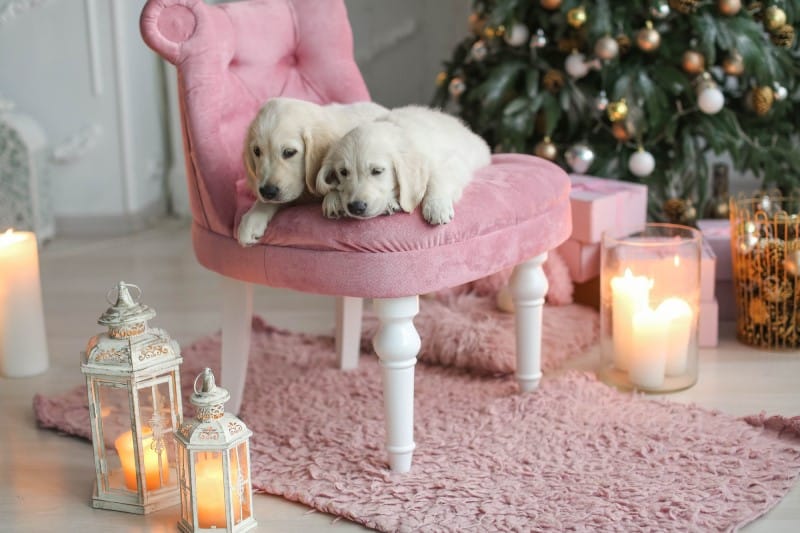Scents are closely associated with emotions in our brains. Smell, out of all five senses, is most successful at triggering emotions and memories. So, it is no wonder why burning a candle is so comforting. Smells of the beach that reminds you of a day baking, or your favorite flower bring those fond associations anywhere in your home. However, when you are worried about how a lit candle may be unsafe for your pet, they are a bit harder to enjoy.
Are candles safe for pets? Candles can pose a safety risk for pets due to the fire hazard and potential stress and irritation from fumes the candles emit into the air. It is safe for some animals to be around candles that are made of safe ingredients being appropriately used. Still, others are more sensitive and should avoid being in a home with lit candles entirely.
Depending on your pet and the type of candle you burn, it may or may not be a good idea to light the wick with your furry friend around.

What Makes Candles Unsafe for Pets?
If your pet is roaming freely and the candle is in a location accessible to them, this can create a fire hazard. Pets may bump into the candle or the piece of furniture it is on and knocks the candle over. This can start a fire or result in burns to your pet. A pet can be burned directly by the flame or by hot wax. The possibility of this depends on the type of pet, their size, and mobility.
Less obvious ways that candles can be harmful to pets is the toxins and chemicals they release into the air while burning. Most candles are made of paraffin wax, a wax derived from petroleum, which is the first contributor to harmful fumes. The scent of the candle can also release chemicals into the air, depending on the candle manufacturer and scent, exactly which chemicals will vary.
Harsh chemicals in the air of your home can cause stress or irritation on your pet’s airway. Most pets have a stronger sense of smell than humans do, so experience the effects of candles more intensely. Since animals are smaller than humans, they naturally are more sensitive to the harmful effects of any substance they come in contact with.
Of course, every type of pet is different, so the risk candles pose for specific kinds of pets can be somewhat unique. Based on the type of pet you have at home, how big they are, how they move, and their unique energy level, you can make informed choices about how and if burning candles is safe.
Dogs
Dogs come in different sizes and, as any dog owner knows, with their unique energy levels. If you have a big dog, the danger of them running into a table or dresser and knocking over a candle is higher, especially if they are highly active. Bigger dogs may be more likely to reach the surface when standing on their hind legs as well, creating an opportunity for them to come in contact with a lit candle.
On the other hand, small dogs that are frequently allowed on furniture may not have any hesitation while climbing nearby a coffee or end table with a lit candle, creating a risky situation as well.
Dogs are known for their especially keen sense of smell, so any scents that are irritating to a dog will sense quite intensely – ” a dog’s powerful sniffer…is thought to be 1,000 to one million times more powerful than a human nose.” (Source: vetstreet.com)
Cats
Cats have been thought to be more sensitive to fragrances than most other animals. Cats hate some smells like lavender or rosemary. Cats metabolize some chemical substances differently and so, can be more susceptible to their effects. A cat’s skin especially is sensitive to fragrance chemicals. So, if a cat was to come in contact with candle wax, it can cause irritation.
Cats often lick their fur, so any skin exposure makes ingesting the substance a risk as well. In the case candle wax does get your cat, the cat’s fur should be washed right away, and the owner should reach out to their veterinarian. (Source: candlemart.com)
Usually, if a fragrance, like a candle, is used as directed, your cat will not experience any problems. Cats, however, are known for their impressive mobility and tendency to climb around and get into things. If your cat commonly swats at items on shelves or tables, you will want to make sure they do not have the opportunity to do this with a candle.
It is safest to only burn candles in a spot your cat can not access or while you are in the room with the candle and able to monitor if your cat gets close by.
Rats
Rats have very strong senses of smell. Their powerful noses, combined with their especially small size, makes them sensitive to the scent and fumes of burning candles.
If you have any pet rats, this does not mean you can not burn candles at all but try to keep the lit candles in a different room than your pet. If you are unsure whether a candle is negatively affecting your pet rats, watch them for increased sniffing, sneezing, or drinking water while it is burning. These behaviors are signs that the candle is irritating them.
Rabbits
Rabbits do not have especially sensitive respiratory systems, and so some exposure to candles is not thought to do any harm. To ensure a safe amount of exposure to candle scents and fumes, burn candles in a room separate from the one your pet rabbit is in.
If you do have a candle nearby the rabbit, make sure the room is well ventilated and watch for behaviors such as sniffing and sneezing that may indicate the smell is irritating them.
Birds
Birds have very sensitive respiratory systems, and so, exposure to any harmful chemicals and smoke can quickly cause damage to your bird’s health.
The respiratory system in birds is largely different from that in mammals. The respiratory system of birds can actually be considered more efficient because it transfers more oxygen with each breath. The same processes that transfer air efficiently, also transfer any toxins that a bird inhales more efficiently. This is why even brief or occasional exposure to candles, like all other harmful air pollutants, should be avoided.
Guinea Pigs
Guinea pigs have a small chest cavity, but very complex upper respiratory systems. This makes them more prone to developing respiratory problems. (Source: unusualpetvets.com) With this in mind, burning candles around your pet guinea pigs are exposing their delicate respiratory system to unnecessary chemicals, smoke, and toxins.
If you have pet guinea pigs, avoid burning any candles in your home to keep them as safe as possible.
What about ‘Pet-Friendly’ Candles?
Some candles are made and advertised to be safe around pets. These candles are often soy or beeswax and contain lead-free wicks to minimize the release of any harmful, unnatural chemicals into the air.
These candles may be unscented or advertise natural ingredients to create their scent. Some of them can remove pet odor. ‘Pet-friendly’ candles are a great alternative to most mainstream brands if you use them carefully and own pets that are less sensitive to the fumes candles create, such as dogs or cats.
If you have an especially sensitive pet, such as a bird or guinea pig, these products, unfortunately, are still a significant risk. Any product designed to disperse a scent into your home should be avoided, and the smoke from a burning candle is still a concern.
Natural Scent Alternatives to Candles
If you are making a choice to go candle-free, you may find yourself missing a sweet scent in your home. Luckily, there are methods of using natural scents to fill your home! Since these methods do not burn anything and use only natural herbs and plants, they are entirely safe for your pet of any kind!
Simmering Spices
By simmering spices, they will draw out their lovely aroma, and it will begin to spread from your kitchen throughout the house. Bring a few cups of water and herbs, fruit peels, or spices to a low simmer. Common ingredients to simmer include cinnamon sticks, citrus peels, cloves, mint leaves, and ginger.
When trying this out, be creative, consider your favorite smells, and see what you have on hand! There is no wrong combination! Just be careful to take the simmer off the stove pot before all the water evaporates out.
Fresh Plants
Placing fresh plants around the house is a beautiful and easy way to purify the air and give your home a fresh, natural scent.
Some houseplants will be more fragrant, while others will give off less of a scent but still purify the air around them. There are lots of options! Consider the look, scent, and care required when shopping for a plant.
Bath Bouquet
If you commonly enjoyed a fresh candle scent in your bathroom, consider a bath bouquet! A bath bouquet is a small bundle of aromatic plants that hangs from the head of your shower. Many people choose to use eucalyptus, but you can arrange your own or shop online for pre-arranged bundles.
While you shower, the hot steam will encourage the plant to release its fragrance, freshening up your bathroom and making every shower a bit more spa-like too!
Read more:
